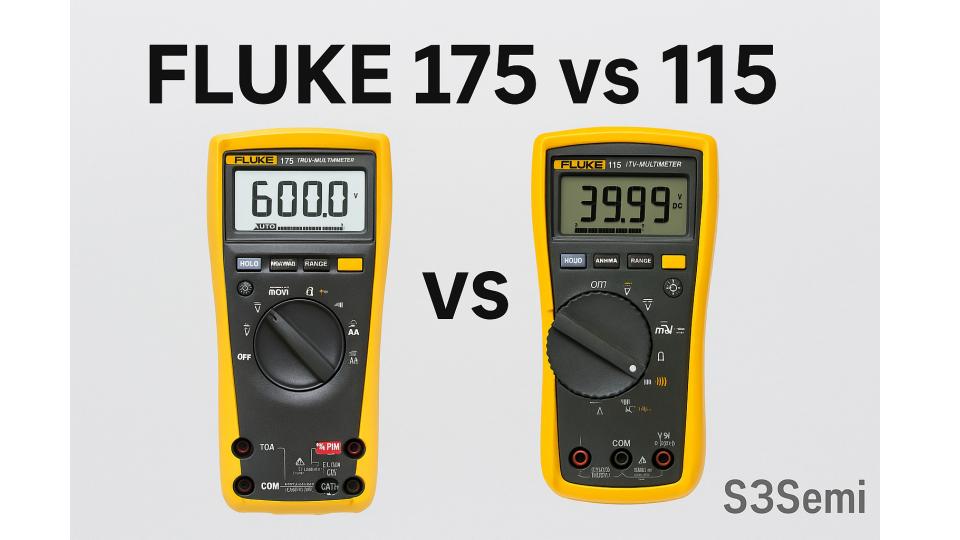The Fluke 175 and Fluke 115 are both true-RMS digital multimeters in Fluke’s lineup, but they target somewhat different users and scenarios.
🏷️ Fluke Multimeter Deals ⭐⭐⭐⭐
Below, you’ll see how they compare, plus pros and cons of each, so you can decide which is better for your needs.
🔍 Quick Product References
- Fluke 175 – a “higher tier” True RMS multimeter with broader capabilities.
- Fluke 115 – a compact, portable True RMS meter often used by field technicians and service work.
📊 Comparison Table
| Feature | Fluke 175 | Fluke 115 |
|---|---|---|
| Voltage range (AC / DC) | Up to 1000 V | Up to 600 V AC/DC |
| Resolution / Counts | 6000 counts, 3¾ digits | 6000 count resolution |
| Accuracy | ±(1.0% + 3) for AC V (typical) | Good for field service; specs vary by range |
| Current range | Up to 10 A | Up to 10 A (with limits) |
| Frequency / Capacitance / Resistance / Continuity | Yes | Yes, includes frequency, capacitance, resistance, continuity, diode |
| Display features | MIN / MAX / AVG modes, auto hold / display hold | MIN / MAX / AVERAGE, backlight, one-hand operation |
| Safety / Category rating | CAT IV 600 V, CAT III 1000 V | CAT III 600 V |
| Size / portability | Larger, heftier | More compact, easier to carry |
| Battery life | Good (spec indicates ~200 h typical with alkaline) | Decent; designed for field use |
| Use case focus | Bench, industrial, broader range | Field service, electronics, lighter use |
| 💳 Pricing | 💲 Check Price | 💲 Check Price |
🏅 Pros & Cons
Fluke 175
Pros
- More voltage range (1000 V capability)
- Higher safety category for more demanding environments
- Stronger feature set for industrial or heavy duty use
- Good for future-proofing if you might need higher voltages or more robust use
Cons
- Bigger and heavier, less convenient for carrying around
- More expensive
- Some features may be overkill for lighter tasks
Fluke 115
Pros
- Compact, easily portable for field technicians
- Good set of features: voltage, current, resistance, continuity, capacitance, diode
- True RMS ensures accurate readings even on non-ideal waveforms
- More affordable for many users
Cons
- Lower voltage max (600 V), not ideal for very high-voltage work
- Less headroom for industrial environments
- Slightly lower safety rating
🧩 Which One Should You Use?
If your work involves industrial or more demanding systems, including high voltages, the Fluke 175 gives you more headroom and safety.
For electronics, field service, maintenance, and home or small systems, the Fluke 115 offers nearly all you need while being more portable and cost-effective.
If you anticipate needing measurements beyond 600 V or greater durability and safety in harsh environments, the Fluke 175 may be the wiser long-term investment.




